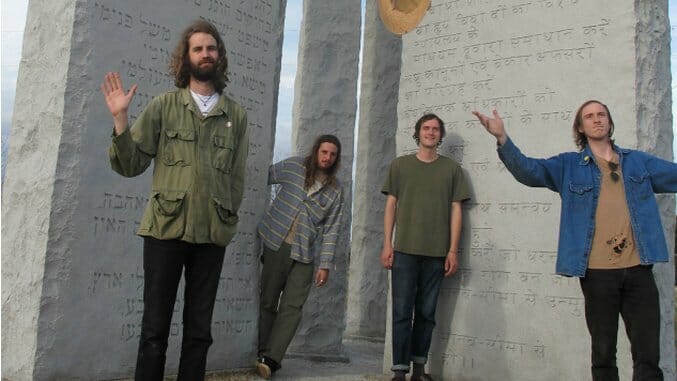Arbor Labor Union: The Best of What’s Next
Photo by Dorothy Stucki
“There’s a certain charm to a place like Georgia,” says Arbor Labor Union guitarist-vocalist Bo Orr. “You can drive 20 minutes in any direction and be in the woods. There are forests here and beautiful parks and trees…”
That charm is what makes Georgia music so singular. With pastoral greenery, plenty of hiking opportunities and easy access to the coast, Georgia geography is quite diverse, and the cultural scenes that have cropped up mirror such a mixed landscape. Only Georgia could have produced R.E.M. and the The B-52’s. And Deerhunter and OutKast. And The Allman Brothers Band and Otis Redding.
Arbor Labor Union is yet another Georgia band who sound like no one else. Comprising Orr, bassist Ryan Evers, guitarist Brian Atoms and drummer Ben Salie, Arbor Labor Union have one foot placed firmly in Atlanta and the other in Athens, two cities separated by 70 miles, each with their own distinct musical profiles. Arbor Labor Union get their transcendental weirdness from Athens, a thronging utopia of jangle pop, DIY rock, and freak synthpop, and their hard-edged bite from Atlanta, a city with strong hardcore and metal scenes.
Even their name recalls Georgia-grown qualities: the trees, the working-class, a sense of rural community. But for the first part of their career, Arbor Labor Union went by a more direct yet equally ecological moniker: Pinecones. They changed names after signing with indie stalwarts Sub Pop to reduce confusion (there was another band with the same name), but in retrospect, the change marks a significant moment in the band’s career.
“Names don’t have that much power, even though they do,” says Orr. “It seemed like we had rules about what a Pinecones song was, but I would say there’s a difference now to what an Arbor Labor Union song is. Meaning that, I feel that we’ve embraced all the aspects of music we enjoy whereas before we tried to keep it this deconstructed thing.”
Orr notes with the name change came a newfound sense of maturity. After all, the band started as little more than a chance for four friends to gather in one room, plug in guitars and just play. Orr speaks frequently about a feeling he and the band are trying to reach something close yet far off, something branching outwards, something pure. The closest he can get to describing it is The Allman Brothers Band’s ode to living, “Blue Sky.”
“Perfect song,” Orr notes. “It contains it all. You can’t put that song on and have a bad time. That feeling—we are searching for a certain feeling. We all grew up on classic rock, [and] bands like CCR were an influence. Loud and clear and straightforward.”
-

-

-

-

-

-

-

-

-

-

-

-

-

-

-

-

-

-

-

-

-

-

-

-

-

-

-

-

-

-

-

-

-

-

-

-

-

-

-

-








































